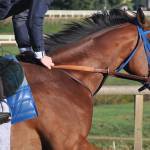Effect of OCD on Performance of Mature Horses

Osteochondritis dissecans, or OCD, is a developmental orthopedic disease (DOD) that affects some young horses. Individuals with OCD have a particular type of cartilage defect in one or more joints. The defects may be small and mostly self-correcting, or serious enough to cause lameness that derails the horse’s chances for a performance career.
A study conducted at the University of Liege in Belgium was designed to evaluate the influence of DOD in general, and OCD in particular, on the performance of 215 warmblood jumper stallions. The researchers reviewed the radiographic and performance records of each horse and determined that, overall, horses with various types of DOD did not perform differently from those without DOD. Among the horses with OCD, however, performance was impacted negatively by lesions in particular locations. Horses with OCD at the upper edge of the fetlock joint had a record of performing in significantly fewer events, and horses with OCD in the stifle joint had significantly fewer performances and scored less well than horses that did not have these defects.
Many factors affect the incidence and severity of DOD, and the type of treatment, if any, also has an effect on how well the horse will perform when it matures. Training method, rider’s skill, choice of discipline, and level of competition must also be considered in evaluating a horse’s performance. While DOD and OCD may not detract from performance in some horses, these problems can be performance-limiting in other horses. This study suggests that the affected joint and the location of the defect within the joint are critical factors in some cases of OCD.








